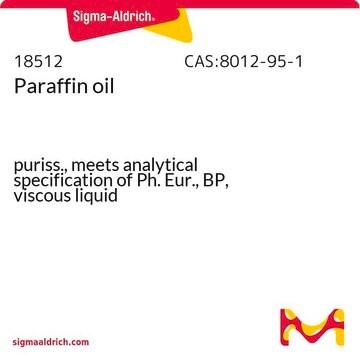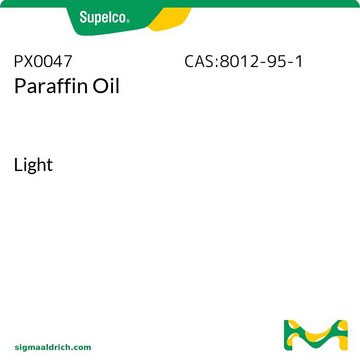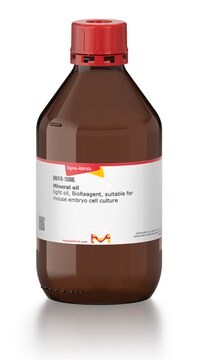76235
Huile de paraffine
suitable for IR spectroscopy
Se connecterpour consulter vos tarifs contractuels et ceux de votre entreprise/organisme
About This Item
Numéro CAS:
Numéro CE :
Numéro MDL:
Code UNSPSC :
12000000
Nomenclature NACRES :
NA.21
Produits recommandés
Forme
oil
Niveau de qualité
Technique(s)
IR spectroscopy: suitable
Indice de réfraction
n20/D 1.473
Viscosité
100-145 mPa.s(20 °C)
Point d'ébullition
300 °C (lit.)
Pf
-24 °C (lit.)
Vous recherchez des produits similaires ? Visite Guide de comparaison des produits
Description générale
Paraffin oil resists water. It is widely used as release agent, lubricant, defoamer and also as coating component.
Application
Paraffin oil has been used in preparation of tyrosinase-modified carbon paste electrode for detection of Catechol.
Mention d'avertissement
Danger
Mentions de danger
Conseils de prudence
Classification des risques
Asp. Tox. 1
Code de la classe de stockage
10 - Combustible liquids
Classe de danger pour l'eau (WGK)
WGK 2
Point d'éclair (°F)
419.0 °F - closed cup
Point d'éclair (°C)
215 °C - closed cup
Équipement de protection individuelle
Eyeshields, Gloves, type ABEK (EN14387) respirator filter
Faites votre choix parmi les versions les plus récentes :
Déjà en possession de ce produit ?
Retrouvez la documentation relative aux produits que vous avez récemment achetés dans la Bibliothèque de documents.
Les clients ont également consulté
Rate-limiting steps of tyrosinase-modified electrodes for the detection of catechol.
Burestedt E
Analytical Chemistry, 68(9), 1605-1611 (1996)
Ozlem Yigit et al.
The Journal of emergency medicine, 42(4), 417-419 (2010-12-24)
Fire-eater's pneumonia is a chemical pneumonitis that can develop after accidental aspiration of liquid hydrocarbon-based fuel during a flame-blowing or a fire-eating performance. Typical findings of the patient are similar with any infectious pneumonia: chest pain, shortness of breath, cough
Jyothi C Abbar et al.
Bioelectrochemistry (Amsterdam, Netherlands), 83, 1-7 (2011-07-26)
The electrochemical oxidation of a hemorheologic drug, pentoxifylline was investigated at a multi-walled carbon nanotubes-paraffin oil paste electrode using cyclic and differential pulse voltammetry. The oxidation process was irreversible over the pH range studied and exhibited an adsorption-controlled behavior. All
Maria Koliou et al.
European journal of pediatrics, 169(7), 833-838 (2009-12-18)
Information on childhood poisonings in Cyprus is limited. Our objective was to examine the epidemiology of poisonings among children in Cyprus. All children up to 15 years of age admitted for poisoning to the Archbishop Makarios Hospital in Nicosia, Cyprus
Yi-Shiung Horng et al.
American journal of physical medicine & rehabilitation, 90(6), 435-442 (2011-03-25)
: The aim of this study was to investigate the effectiveness of tendon and nerve gliding exercises as a part of combined treatments for carpal tunnel syndrome. : Patients with carpal tunnel syndrome were randomized into three groups. All patients
Notre équipe de scientifiques dispose d'une expérience dans tous les secteurs de la recherche, notamment en sciences de la vie, science des matériaux, synthèse chimique, chromatographie, analyse et dans de nombreux autres domaines..
Contacter notre Service technique










